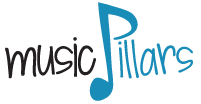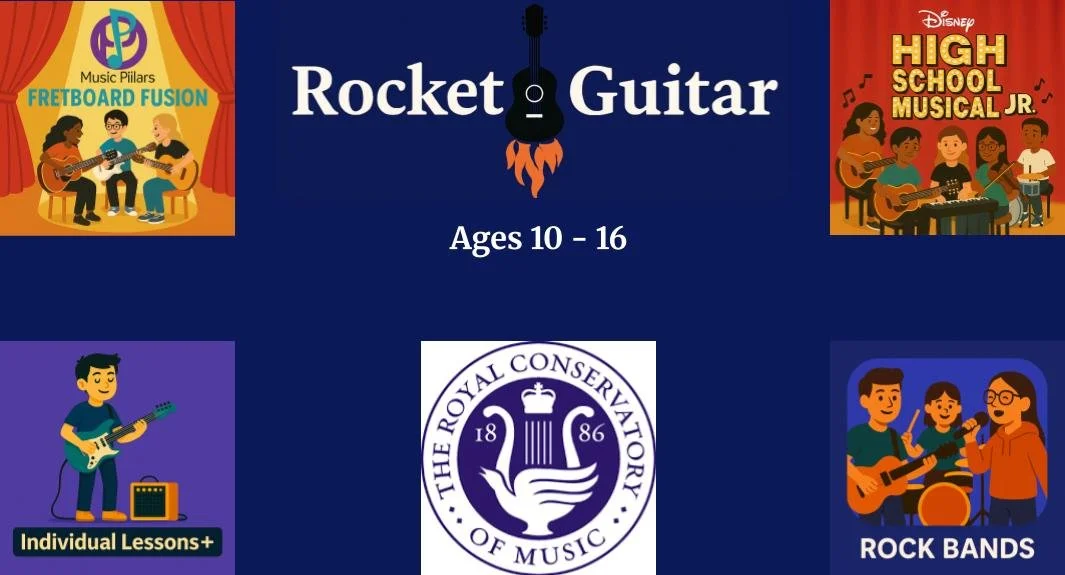Guitar Lessons at Music Pillars
Our Rocket Guitar Program
Come experience the dynamic fun of learning to play the guitar with us! The Rocket Guitar program begins with a combination of in-person, small group, and playing/passing off songs as software analysis the student’s progress and provides feedback. This trifecta of 1. Positive Peer Pressure through small group interaction, 2. Analog feedback from a teacher in-person, and 3. Objective software feedback that tracks and monitors progress so that the student, the parent, and the teacher can all be on the same page on important metrics related to really learning the guitar! The program is broken up (roughly, some individual adaptations are made from student to student) into the early/intermediate phase (typically ages 8-10, and the intermediate/advanced phase (typically ages 10 - 16).
Beginning - Intermediate Guitar Lessons
Guitar Level 1
Learn fundamental guitar skills including tuning and playing position.
Understand basic music theory and musical symbols.
Master notes in the first position.
Learn essential chords: C, G, G7, D, D7, A7, and Em.
Develop rhythm skills up to eighth notes.
Explore strumming and picking techniques with over 80 songs, riffs, and examples.
Guitar Level 2
Learn new chords: Am, Dm, A, E, F, and B7, plus power chords.
Expand on fingerstyle techniques, Carter-style solos, and bass runs.
Introduce pentatonic scales and improvisation.
Explore advanced rhythmic concepts: syncopation, dotted rhythms, and triplets.
Learn to read tablature alongside standard notation and notes in first and second positions.
Apply techniques with songs and examples from folk, blues, classical, and traditional styles.
Little Rockers
Music Pillars offers exciting Rock Band programs designed to transform young musicians into confident performers. Children ages 8-14 (spanning their "The Cool Kids" and "Advanced Teens" groups) can experience the thrill of regular rehearsals and performing at cool venues like Knotts Berry Farm and the Hard Rock Cafe. Beyond just playing an instrument, students develop crucial stage presence and valuable life skills, boosting their confidence in front of an audience. This unique experience fosters increased musicianship through positive peer pressure, making learning fun and engaging while breaking free from routine practice. Auditions are recommended to ensure placement in the best-fit band.
Intermediate to Early Advanced Guitar
Individual Lessons+
Holistic Skill Development: Lessons focus on cultivating well-rounded musicians by teaching standard music notation, chord charts, tablature, and playing by ear.
Diverse Musical Exploration: The comprehensive approach empowers students to confidently learn various musical genres and prepare for different performance settings.
The "Pillars" Curriculum: Our unique curriculum guides students in fostering creativity, recognizing fretboard patterns, understanding music theory, enhancing dexterity, developing audiation, improving sight-reading, and exploring improvisation.
Confidence Through Performance: We emphasize building confidence and stage presence by providing frequent performance opportunities.
Enjoyable Musical Growth: The focus is on consistent, enjoyable musical development rather than just traditional, infrequent recitals.
Fretboard Fusion (not available fall 25)
Before Joining: Students should have basic guitar skills from beginner programs (chords, strumming, simple melodies), be able to prepare assigned materials independently, and come with a collaborative, open attitude.
Collaboration & Listening: Learn to listen, respond, and play cohesively with others, focusing on timing, dynamics, and supporting the group.
Song Arrangement & Creativity: Participate in shaping songs live by experimenting with chord variations, rhythm changes, and adding fills or solos.
Improvisation & Musical Growth: Practice simple improvisation and solos, explore different styles, and develop musical creativity under teacher guidance.
Communication & Confidence: Build on-stage communication skills and gain confidence through regular low-pressure performances with peers.
Ensemble & Performance Skills: Improve timing, rhythm, and band etiquette while learning when to lead or support in a group setting.
The Royal Conservatory of Music
Structured Guitar Curriculum: Students follow RCM’s graded guitar syllabus, progressing through levels with increasing technical demands, repertoire, sight-reading, and ear training tailored for guitar.
Technical & Performance Skills: Students develop essential guitar techniques—scales, chords, picking patterns, and expressive playing—while preparing a diverse repertoire including classical and contemporary pieces.
Theory & Musicianship Integration: RCM requires complementary study of music theory and ear training, helping students understand rhythm, harmony, and musical structure alongside their guitar practice
Examinations & Assessments: Students can take official RCM guitar exams to evaluate skills; third-party teachers guide exam preparation, provide feedback, and build confidence for performance and technical components.
Personalized Instruction & Progress Tracking: Teachers tailor lessons to RCM standards, pace students’ progress according to their abilities, assign practice materials, and offer ongoing support to ensure steady improvement.
Performance Opportunities & Long-Term Pathways: The program encourages participation in recitals and festivals, with teachers fostering students’ stage presence and helping them pursue advanced RCM diplomas or further music education.
Rock Bands
Audition Required: Must demonstrate basic proficiency on guitar technique and rhythm, and group playing skills.
Foundational to intermediate musicianship with focus on collaboration, including arrangement, dynamics, and on-stage teamwork, as well as soloing.
Weekly group rehearsals emphasizing tight performance, arrangement refinement, and stage presence and collaborative dynamics.
Perform live shows and community events
Opportunities for arranging and contributing to the band's creative direction.
Ongoing participation and requires consistent attendance and practice.
Core Principles of Guitar Lessons
HAVING FUN WHILE STILL LEARNING AND GROWING AS A GUITAR STUDENT
Guitar Lessons at Music Pillars focus on developing well-rounded musicians who can thrive in different musical environments. Our students learn to read standard music notation, chord charts, and tablature so that they can effectively learn different types of music and play in different types of ensembles. We may also help a student learn songs by ear to develop that challenging but valuable skill. Guitar Students in our rock bands play acoustic and electric guitars, learn songs from many different genres and eras of music, and may even improvise a guitar solo!
Rock Bands - Ensemble Opportunity for Guitar Students
The joy of music is multiplied when you do it with others! Our Rock Bands provide excellent opportunities for the growth and development of a guitar student, while also making friends and enjoying the social life of being in a band! Students audition to join a band and are placed with fellow students of similar abilities. Many performances around town soon follow!
We have over 100 brief guitar videos for students to reference in-between lessons as they work through their first method book!
Guitar Students Perform Frequently at Friday Fest Recitals
Students who go to lessons and then perform once every 6 months will struggle to become good performers. Would you ever sign up your son or daughter to learn to play soccer by having them go to practice for 5 months and then play in one single game that lasts only a few minutes? Sounds silly right? But time and time again we see students subjected to this ineffective tradition of performing once or twice a year in a terrifying recital, and never growing and learning to be a better and more confident performer. There is no replacing performance experience!
Students should be up on stage playing 2-4 songs every 6-10 weeks. They should learn and be taught to be confident performers, and that will never happen with such little stage time. They need to be on stage more often, and they need to perform several pieces of music so that they are up on stage 3-10 minutes each time. This gives their heart a chance to slow down some, and so they begin to relax while up there. This process should be repeated over and over and over again. There is no substitute or secret sauce for becoming a confident performer. It takes much more time on stage than what is traditionally done. Too many teachers and studios focus on their student’s playing a piece of music flawlessly on stage. The emphasis should be on the development of the student. The notes are important too, but more important than a perfectly executed piece of music is the maturation and development of a child to learn that they can be in front of people, and be confident, and even enjoy themselves. We develop students who can enjoy themselves and own their experience on stage - and enrich their audiences lives with music.













